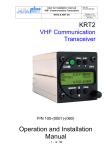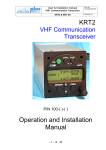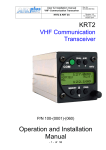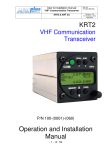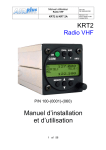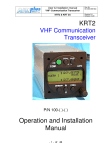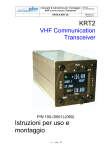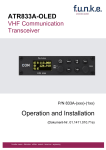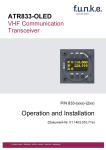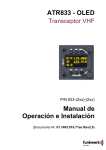Download KRT2 Operation and Installation Manual
Transcript
User & Installation manual Doc.-Nr: DE-3000-800100e VHF- Communication Transceiver KRT2 Revision 11.3 Aug. 2015 KRT2 VHF Communication Transceiver P/N 100-(0002)-(800) Operation and Installation Manual 1 / 60 User & Installation manual Doc.-Nr: DE-3000-800100e VHF- Communication Transceiver Revision 11.3 Aug. 2015 KRT2 Record of Revisions Revision Date Subject 1 06 Juni 2010 First issue 2 20 Sep 2010 Revision Stecker / Redaktionelle Änderungen 3 05 Feb 2011 Editorial update 4 04 Mai 2012 Cable-harness correction 5 16 Mai 2012 Software advantage for battery indication, error reports 6 19.Aug 2012 Hints for mic. Installation & intercom 7 Sept. 2012 Correction wiring 8 Dec. 2012 Dynamic Microphone GND-wiring 8.1, 8,2 Feb.2013 Text corrections 9 March 2013 Additional drawing, clarify microphone GND 9.1 March 2013 Text corrections 9.2 April 2013 Hints in drawings 9.3 Aug. 2013 Text corrections, new cable drawings 9.4 Okt. 2013 Text corrections 9.5 Nov. 2013 New favourites management 9.6 Mai 2014 Menu-limitation, PTT-Mic.-assignment, Installation limitations, Text corrections, Mic.-AUTO-enhancement 9.7 Jun 2014 Hint for speaker installation 9.8 July 2014 Add chapter 6.6.2 and 6.8.3.1, add drawing motorglider 9.9 Nov 2014 Update Installation and Limitations Section. 10.0 Dec. 2014 New Display 11.0 May 2015 Specialty of two PTT 11.1 Jun 2015 Recommendation for SIT 11.2 July 2015 6.8.3.2 Schematic correction (TX/RX) 11.3 Aug 2015 6.6.5 Supplement for speaker grounding 2 / 60 User & Installation manual Doc.-Nr: DE-3000-800100e VHF- Communication Transceiver Revision 11.3 Aug. 2015 KRT2 List of Service-Bulletins (SB) Service-Bulletins have to be inserted in the manual, and entered in the table. SB Number Rev. No. Date Issued Date Inserted Unit overview Item No. Product Overview Basic Version Introduction of:: • 2 Standard Microphone Inputs • Auxiliary Audio Input • DUAL Watch Function 3 / 60 Name User & Installation manual Doc.-Nr: DE-3000-800100e VHF- Communication Transceiver KRT2 Revision 11.3 Aug. 2015 TABLE OF CONTENTS 1 GENERAL ..........................................................................................................................6 1.1 1.2 1.3 1.4 2 Installation limitation ...........................................................................................................9 2.1 3 Installation ....................................................................................................................... 9 CONTROL general ...........................................................................................................10 3.1 3.2 3.3 3.4 4 Symbols ........................................................................................................................... 6 Abbreviations .................................................................................................................. 7 Customer Service............................................................................................................. 8 KRT2 Transceiver properties .......................................................................................... 8 Control Elements Overview .......................................................................................... 10 Display........................................................................................................................... 12 Audio Menu levels ........................................................................................................ 13 Self-test error reports ..................................................................................................... 14 OPERATION ....................................................................................................................15 4.1 General........................................................................................................................... 15 4.2 ON / OFF Switching...................................................................................................... 15 4.3 Frequency Selection ...................................................................................................... 16 4.3.1 Direct Frequency Selection .................................................................................... 16 4.3.2 Frequency Selection from the Favourites List ....................................................... 17 4.3.3 Storing and Editing Favourites............................................................................... 17 4.4 AUD – Audio Menu ...................................................................................................... 20 4.4.1 VOL – Volume....................................................................................................... 20 4.4.2 SQ -- Squelch ......................................................................................................... 20 4.4.3 VOX – Intercom Voice Trigger Level Setting ....................................................... 21 4.4.4 Manual Intercom..................................................................................................... 21 4.4.5 TXm – PTT Switch Selection ................................................................................ 22 4.4.6 INT – Intercom Volume ......................................................................................... 22 4.4.7 EXT – External Audio Input Volume .................................................................... 22 4.4.8 DIM – Display Brightness...................................................................................... 23 4.4.9 BAT – Battery test.................................................................................................. 23 4.4.10 SIT – Side tone ....................................................................................................... 24 4.4.11 MIC – Setup ........................................................................................................... 24 4.4.12 Menu lock............................................................................................................... 27 4.5 DUAL Watch................................................................................................................. 27 4.6 Transmitter Operation.................................................................................................... 29 4.6.1 Speciality of two PTT ............................................................................................ 30 4.6.2 Self-test monitor..................................................................................................... 30 4.6.3 Optical side tone..................................................................................................... 31 4.7 Resetting to factory settings .......................................................................................... 32 4.8 SET UP - Menu ............................................................................................................. 32 4.8.1 ERASE – Erasing the Favourites List .................................................................... 33 4.8.2 Channel Spacing..................................................................................................... 33 5 6 Remote Control ................................................................................................................34 Installation ........................................................................................................................35 6.1 Installation Hints ........................................................................................................... 35 4 / 60 User & Installation manual Doc.-Nr: DE-3000-800100e VHF- Communication Transceiver KRT2 Revision 11.3 Aug. 2015 6.2 Telecommunication Data............................................................................................... 35 6.3 Scope of delivery ........................................................................................................... 35 6.4 Unpacking and Inspecting the Equipment..................................................................... 36 6.5 Mounting ....................................................................................................................... 36 6.6 Electrical Connections................................................................................................... 37 6.6.1 Microphone-Connection......................................................................................... 37 6.6.2 Speaker & open microphone:................................................................................. 38 6.6.3 Earphone Connection ............................................................................................. 39 6.6.4 External Audio Input.............................................................................................. 39 6.6.5 Speaker Connection................................................................................................ 39 6.7 Finally Audio-Setup ...................................................................................................... 40 6.7.1 For gliders .............................................................................................................. 40 6.7.2 For motor gliders dual seaters ................................................................................ 40 6.7.3 For Motor planes .................................................................................................... 40 6.8 Wiring............................................................................................................................ 42 6.8.1 Wire Gauges........................................................................................................... 42 6.8.2 Connector Pin-Configuration ................................................................................. 42 6.8.3 Wiring Diagram...................................................................................................... 43 6.8.3.1 Two place motor aircraft connection .............................................................. 43 6.8.3.2 Glider two place connection ........................................................................... 44 6.8.3.3 Glider single.................................................................................................... 46 6.8.3.4 Motor glider single.......................................................................................... 47 6.8.3.5 Motor glider dual ............................................................................................ 48 6.8.4 Wiring for dynamic microphones .......................................................................... 50 6.8.5 Connection support ................................................................................................ 50 6.9 Antenna.......................................................................................................................... 51 6.9.1 Antenna Selection .................................................................................................. 51 6.9.2 Installation Recommendation................................................................................. 51 6.10 Microphone general ................................................................................................... 52 6.11 Post-Installation Check .............................................................................................. 53 6.12 Starting Up ................................................................................................................. 54 6.13 Accessories ................................................................................................................ 54 6.14 Drawings .................................................................................................................... 55 6.14.1 Dimensions............................................................................................................. 55 6.14.2 Installation Directions ............................................................................................ 56 7 Maintenance.....................................................................................................................57 7.1 7.2 7.3 8 Periodic Maintenance .................................................................................................... 57 Repair ............................................................................................................................ 57 Cleaning......................................................................................................................... 57 ANNEX.............................................................................................................................58 8.1 8.2 Frequency / Channel- schedule ..................................................................................... 58 Technical Data............................................................................................................... 59 5 / 60 User & Installation manual Doc.-Nr: DE-3000-800100e VHF- Communication Transceiver KRT2 Revision 11.3 Aug. 2015 1 GENERAL This manual contains information about the physical, mechanical and electrical properties as well as a description for the operation and installation of the VHF airborne transceiver KRT2. 1.1 Symbols WARNING Non-compliance may cause personnel injury due to radiation or fire. CAUTION Non-compliance may cause damage or incorrect operation of the transceiver. INFORMATION 6 / 60 User & Installation manual Doc.-Nr: DE-3000-800100e VHF- Communication Transceiver Revision 11.3 Aug. 2015 KRT2 1.2 Abbreviations Abb Description Definition PTT Push to Talk Transmitter activation VOX Voice operated intercom Voice level setting for intercom activation INT Intercom level Intercom volume level setting SQ Squelch Squelch setting DIM Dimming Display brightness setting BAT Battery control Check DC source EXT External audio input External Audio input level setting 7 / 60 User & Installation manual Doc.-Nr: DE-3000-800100e VHF- Communication Transceiver KRT2 Revision 11.3 Aug. 2015 1.3 Customer Service In order to process returned units most expeditiously, please fill in the form Reshipment to be found under Service at http://www.dittelavionik.de. Suggestions which will improve this manual are very much appreciated at: http://www.dittel-avionik.de. Information concerning software updates are available under AIRplus Avionics at http://www.dittel-avionik.de. 1.4 KRT2 Transceiver properties • • • • • • • • VHF airborne transceiver Frequency range 118,000 to 136,975 MHz Channel spacing 8,33/25 kHz (2278 channel) Fast channel selection 4 separate microphone inputs (2 x standard or 2 x dynamics) Audio-input for other audio devices Installation: Standard panel cut-out (57 mm) 100 user definable frequencies with up to 8 character designators Continuous transmissions will be turned off after 2 minutes. (Stuck mic function) 8 / 60 User & Installation manual Doc.-Nr: DE-3000-800100e VHF- Communication Transceiver KRT2 2 Revision 11.3 Aug. 2015 Installation limitation The conditions and tests required for (E)TSO approval of this article are minimum performance standards. It is the responsibility of those installing this article either on or within a specific type or class of aircraft to determine that the aircraft installation conditions are within the (E)TSO standards. (E)TSO articles must have separate approval for installation in aircraft. The article may be installed only if the installation is performed in accordance with Part 43 or the applicable airworthiness requirements. 2.1 Installation For installation hints, data, electrical connections and mounting instructions please see section “6 Installation”. 9 / 60 User & Installation manual Doc.-Nr: DE-3000-800100e VHF- Communication Transceiver KRT2 3 Revision 11.3 Aug. 2015 CONTROL general 3.1 Control Elements Overview ON / OFF Self-locking switch 1. Scanning between the Active and Standby frequencies DUAL WATCH 2. Positioning cursor to the left when programming the station designator 10 / 60 User & Installation manual Doc.-Nr: DE-3000-800100e VHF- Communication Transceiver KRT2 AUDIO SELECT Revision 11.3 Aug. 2015 1. Stepping through the audio menus VOL SQ VOX TX INT EXT DIM CON SIT and MIC 2. Positioning cursor to the right when programming the station designator 1. Frequency and designator selection from the favourites list FAVOURITES 2. Programming of favourites (frequency and designator) EXCHANGE Exchange of the Active and Standby frequencies Pressing for Selection of the frequency range to: MHz, 100kHz, 10kHz Toggles between frequency and designator when programming the favourites TURNING KNOB Sets all variable values in any menu 1. Volume setting of headsets and speakers 2. MHz/kHz selection of the standby frequency in 3 different ranges 3. Favourite selection 4. Alpha character selection when programming favourites 5. Change of microphone settings 11 / 60 User & Installation manual Doc.-Nr: DE-3000-800100e VHF- Communication Transceiver KRT2 Revision 11.3 Aug. 2015 3.2 Display Indication Meaning Remarks RX Reception RX is displayed during reception with a squelch value of 02 or more TX Transmission Transmitter operates normally Te 119.700 Transmitter was turned off automatically after 2 min continuous operation Active frequency ZELL SEE Active frequency station designator VOL …… Receiver volume level (default after a certain time delay) DUAL Active frequency AND Standby Frequency are monitored simultaneously MEM Favourite list index (0-99) 119.700 upper 125.800 lower < BAT Active Displayed when frequency and designator is stored in the favourite list When AUD was pressed the corresponding Audio Menu item and setting is displayed DUAL function is deactivated by frequency change or by pressing the DUAL button again When frequency and designator are stored at this index they are displayed - frequency Standby/Dual - frequency The pointer indicates what the turning knob will change 1) VOL SQ VOX…..etc 2) Standby frequency Supply voltage is low <10,5V 12 / 60 Arrow is positioned in correspondence to the button pressed ( AUD or FREQ) Battery low or Battery/Generator faulty User & Installation manual Doc.-Nr: DE-3000-800100e VHF- Communication Transceiver KRT2 A-match Antenna error ave Status of certain Audio menu functions MUC IN Standby frequency station designator Revision 11.3 Aug. 2015 Bad antenna match a = AUX. Input active v = VOX active e = external Intercom switch active Displayed when frequency and designator is stored in the favourite list 3.3 Audio Menu levels Displayed VOL SQ VOX DIM BAT INT EXT TX** SIT MIC Signification Volume Squelch Voice operated intercom Display brightness DC source check Intercom - Volume Volume of external devices PTT button selection Side tone SetUp-Menu for Mikrophones 13 / 60 Remarks Default level Left/Right/Both During transmitter operation Service-Menu ohne Funkbetrieb. User & Installation manual Doc.-Nr: DE-3000-800100e VHF- Communication Transceiver KRT2 Revision 11.3 Aug. 2015 3.4 Self-test error reports Display Er_PLL Er_ADC Er_FPA Er_I2C Er_si53 Er_D10 Key_Block Meaning Internal error, no transmission Internal error, Internal error; unit not usable Internal error; unit not usable Internal error; unit not usable Internal error; reception corrupt Internal error; unit not usable 14 / 60 Remark Return the transceiver for maintenance Return the transceiver for maintenance Return the transceiver for maintenance Return the transceiver for maintenance Return the transceiver for maintenance Return the transceiver for maintenance Return the transceiver for maintenance User & Installation manual Doc.-Nr: DE-3000-800100e VHF- Communication Transceiver Revision 11.3 Aug. 2015 KRT2 4 OPERATION 4.1 General In the normal operating mode in which the turning knob always is connected to the volume (VOL). The normal operating mode can be left by pressing the AUD, FREQ or MEMORY button. When not in the normal mode and there is no pilot action for more than 10 seconds the unit returns to the normal mode. 4.2 ON / OFF Switching ON / OFF switching is by the self-locking push switch. After power up the following display will be displayed: Device-name KRT2 SoftwareVersion e.g. V8.2 (example) The unit then starts in the normal operating mode using and displaying the data last used. 15 / 60 User & Installation manual Doc.-Nr: DE-3000-800100e VHF- Communication Transceiver KRT2 Revision 11.3 Aug. 2015 4.3 Frequency Selection There are two different frequency selection methods: • Direct Input • Selection from the favourite list (index 0-99) 4.3.1 Direct Frequency Selection The Standby-Frequency is set with the turning knob in 3 different ranges. The selected range is highlighted and can be changed with the FREQ button. Frequency ranges are: 1xx.nnn 1nn.xnn 1nn.nxx Press the FREQ button once or several times until the desired frequency range is highlighted. When the pointer is not next to the Standby Frequency window, it will be repositioned with the first pressing of the FREQ button. Exchanges the Active and Standby frequencies. When the Exchange button was not pressed, the Standby frequency display will return to its normal appearance after 20 seconds. 16 / 60 User & Installation manual Doc.-Nr: DE-3000-800100e VHF- Communication Transceiver KRT2 4.3.2 Revision 11.3 Aug. 2015 Frequency Selection from the Favourites List By pressing and operating the turning knob a specific favourite list position can be accessed [xx] (xx = index 0 … 99). When frequency and station designator have been defined, they will be displayed in the Standby and station designator windows. The favourite list designators can be sorted in alphabetic order (see 4.3.3 Storing and Editing Favourites). Exchanges the Active and Standby frequencies. The selection procedure can be terminated with either the AUD or FREQ buttons. Without pressing any of these buttons the unit will return to its normal operating mode after 20 seconds. 4.3.3 Storing and Editing Favourites Any displayed Standby Frequency can be given a designator and both can be stored together as favourites in the favourite list. Both the frequency and designator of a favourite can be edited. First press button and by means of the turning knob go to the desired favourite list position which may be empty or the favourite to be edited (index [00 …99]). Press the MEMORY button a second time and „–EDIT--„ will show up in the program window. 17 / 60 User & Installation manual Doc.-Nr: DE-3000-800100e VHF- Communication Transceiver Revision 11.3 Aug. 2015 KRT2 In the designator window a blinking cursor will show up under the extreme left character. The turning knob selects the desired character. The AUD button positions the curser one character to the right. The DUAL button positions the cursor one character to the left and simultaneously erases this character. The station designator can consist of maximum 8 characters. To change frequency just press the FREQ button and follow the normal direct input procedure to edit the frequency. To quite the frequency input press the MEMORY button again in order to go to the station designator window for editing the designator if required. Using the buttons FREQ and MEMORY it can be toggled any time between designator and frequency input. Keep in mind the watch dog timer which will terminate the input mode after 20 sec. Termination / save From the designator mode only terminate just by pressing , for short time it appears “SAVE” and the system goes back into favourite selection. A sorting process can be activated by pressing again MEMORY from EDIT-mode. 18 / 60 User & Installation manual Doc.-Nr: DE-3000-800100e VHF- Communication Transceiver KRT2 Revision 11.3 Aug. 2015 SORT? will show up which stays for 20 seconds and it should be activated by or skipped by MEMORY. When activated all 99 favourites will sorted in alphabetical order which can take several minutes. During the sort procedure „RUN nn“ is displayed in the program window, with nn being the running index. After skip or end of sort the transceiver then resumes the normal operating mode. When the MEMORY button is pressed during the time when „RUN nn“ is displayed the sorting procedure is terminated. The favourite list then is sorted partially only and the transceiver resumes the normal operating mode. Example: 1.) Button MEM -> 2.) Button MEM -> SEL [23] = Select location -EDIT= Input of name Rotation knop to select character For cursor use (AUD) (DUAL) Frequency setting -> press knop Use button MEM to go back to -EDIT- 3.) Button -> shortly SAVE -> back to 1.) (do nothing = cancelling) 4.) Button MEM -> question for SORT Yes = , No = MEM or do nothing. 19 / 60 User & Installation manual Doc.-Nr: DE-3000-800100e VHF- Communication Transceiver Revision 11.3 Aug. 2015 KRT2 4.4 AUD – Audio Menu Any action in the Audio Menu requires the pointer (<) to be next to the Audio menu window (see picture). When the pointer is next to the Standby frequency window, the pointer can be repositioned by pressing the AUD button once. VOLnn is the Audio menu default display. No action on any control for more than 10 seconds will result in the VOLnn display. Audio Menu items can be accessed in the following order by repeatedly pressing the AUD button. VOL (default) SQ VOX TXm** INT EXT DIM SIT MIC Audio menu items to right of the above list are less used than the left ones. 4.4.1 VOL – Volume Turning the turning knob changes the receiver volume. VOLnn Range: 01 – 16 The VOL setting only concerns the receiver and not the intercom system. Intercom volume values are set in the INT audio menu. 4.4.2 SQ -- Squelch Pressing the AUD button once enables the turning knob to change the squelch level values. SQnn Value range: 01 – 10 20 / 60 User & Installation manual Doc.-Nr: DE-3000-800100e VHF- Communication Transceiver KRT2 Revision 11.3 Aug. 2015 The Squelch setting is depending on several factors. For engine driven airplanes an initial setting of 05-08 is recommended. Gliders may need a lower setting. The lower the Squelch level value the higher is the input sensitivity. A high sensitivity setting is susceptible to noise from other sources like ignition strobe-lights etc. Standard SQ-level is 05 ... 08. Higher setting will suppress weaker input signals. 01 = Squelch off, 02 = for long range. Squelch does not influence the intercom system. 4.4.3 VOX – Intercom Voice Trigger Level Setting Pressing the AUD button twice enables the turning knob to change the voice level which triggers the intercom. The intercom voice trigger level must be set to such a value which prevents that normal cockpit noise being heard in the earphones. The intercom system should only be activated when talking at a normal voice level into the microphone. The higher the trigger level the louder the voice must be in order to trigger the intercom system. VOX on condition is indicated by flag “v”. VOXnn Range: 01 – 10 In gliders with active speaker use VOX=10 only. 4.4.4 Manual Intercom In case of extreme cockpit noise or uncompensated microphones the Intercom can be controlled manually by using an external switch. Therefore the VOX system must be activated permanently by selecting VOX: 01. To turn off the Intercom the talk switch (default closed) must be opened, which will be indicated by “e”. The manual Intercom turnoff only works by a deactivated external audio input (see 4.4.7). For use in gliders the VOX has to be set to 10 for disabling the speaker control. 21 / 60 User & Installation manual Doc.-Nr: DE-3000-800100e VHF- Communication Transceiver KRT2 Revision 11.3 Aug. 2015 4.4.5 TXm – PTT Switch Selection Pressing the AUD button three times enables the turning knob to enable certain PTT switches. On transmission only that microphone will be enabled which is related to the PTT-L/R. The equivalent indication is TX or TX1 / TX2. On transmission only the PTT-L/R related microphone will be activated. TXm** *- Left / -* Right / ** Both 4.4.6 INT – Intercom Volume Pressing the AUD button four times enables the turning knob to set the intercom volume. INTnn Range: 01 – 10 4.4.7 EXT – External Audio Input Volume Pressing the AUD button five times enables the turning knob to set the external audio input volume. External audio inputs can be audio alarms, voice alarms, Vario, etc. Required level is 200mVpp (6Vpp max). Activation occurs for settings >00 and will be indicated by the flag “a”. 00 = turning off, 01 lowest level without threshold, 9 = highest gain. EXTnn Range: 00 - 10 22 / 60 User & Installation manual Doc.-Nr: DE-3000-800100e VHF- Communication Transceiver KRT2 Revision 11.3 Aug. 2015 4.4.8 DIM – Display Brightness Pressing the AUD button six times enables the turning knob to set the display brightness. Display lighting current drain at maximum brightness is only 10mA. Maximum brightness is glare free even in darkness and can be used continuously. DIMnn Range: 01 – 16 4.4.9 BAT – Battery test Pressing the AUD button seven times enables the turning knob to display the battery voltage. 23 / 60 User & Installation manual Doc.-Nr: DE-3000-800100e VHF- Communication Transceiver KRT2 4.4.10 Revision 11.3 Aug. 2015 SIT – Side tone Pressing the AUD button eight times enables the turning knob to set the side tone volume. (for gliders should be set to 01) SITnn 4.4.11 Range: 0 – 9 MIC – Setup This mode is for microphone setup and test only without using the PTT. It is not for normal operation. Each of the two microphone input channels can be configured individually, which enables different microphone types to be used. A maximum of two microphones of same type may be connected to each microphone input channel (see chapter 6.6.1 Microphone-Connection). The MIC – Setup is the last item of the Audio menu and can be accessed by pressing the AUD button nine times. By pressing the DUAL button repeatedly L, R and AUTO can be selected. L (R) means left (right) microphone input channel. The AUTO function is explained later. By means of the turning knob the displayed microphone input channel amplifier gain (MIC-level-01-=-low-gain,-09-=high-gain) can be selected 24 / 60 User & Installation manual Doc.-Nr: DE-3000-800100e VHF- Communication Transceiver KRT2 Revision 11.3 Aug. 2015 individually. The microphone signal level is dynamically displayed as bar and as numeric value (from-0.00-to-1.00) in the line below. The initial MIC-level should be 05, the engine should be running, use a headset or earphone and speak at a normal voice level to fine-tune the MIC-level. Whenever a new MIC-level is selected, the dynamic bar indicator should then be at about 50%. Special hint: At activation of MIC-Setup the present condition of speaker switch will remain (SQU on/off). At speaker use a feet back can become active. When the microphone setup menu is terminated, the new value is stored. To activate AUTO the menu should be terminated with this selection, else leave in L or R position. The range of the MIC-level for standard microphones is 01 to 09. MIC levels 10 and 11 are special settings for low microphone levels like dynamic micro-phones often used in gliders. Those levels are valid for the left (L) input only. 10 is used for non-amplified Electret microphones with a 8 volt supply voltage. 11 is for dynamic microphones only. For high gain selection (> 9) the use of side tone can lead to a feed back at transmission. In that case it should be set to SIT01. In the AUTO mode (up to Firmware version 6.16 every 30 sec. then at transmission start) the left microphone impedance is measured. When using an Electret microphone but a dynamic microphone is recognized, internal switchover to the dynamic microphone type and vice versa will take place. When using a dynamic microphone and an Electret microphone is recognized, internal switchover to the Electret microphone type will take place. For the dynamic microphone the gain value 11 will be set for L. If Electret is recognized the presented values will be set. 25 / 60 User & Installation manual Doc.-Nr: DE-3000-800100e VHF- Communication Transceiver KRT2 Revision 11.3 Aug. 2015 The present recognized type will be updated (Mic: dyn/std) only if the mic.setup is re-entered. For the std-part the previous individual setup is stored when the menu was leaving. The MIC submenu is terminated by pressing the AUD button. Additional indications Additional indications for test purposes: RxS : RF receiver input level (from Automatic Gain Control) Ext : External audio input voltage Mic : dyn or Mic: std Display indicates, which microphone type has been selected after entering the mic.-menu. After firmware 6.17 or 7.02: This Symbol appears on right side of STBY-Frequency in AUTO-mode if the dynamic microphone has been recognized and activated after transmission. To reactivate the intercom a short press of the PTT is required. 26 / 60 Doc.-Nr: DE-3000-800100e User & Installation manual VHF- Communication Transceiver Revision 11.3 Aug. 2015 KRT2 4.4.12 Menu lock For school operation the menus area TXm to MIC-setup can be locked. To lock or unlock the button combination AUD & FREQ has to be pressed simultaneously for > 2 seconds. In lock condition there will be displayed a “L” at the right end of the third line. To store those condition the setting of SQnn should be changed before turning off. VOL SQ VOX Available TXm INT EXT DIM CON SIT MIC Locked and not available 4.5 DUAL Watch Because the communication transceiver KRT2 contains only one receiver, DUAL watch is achieved by alternating between the Active and Standby frequencies. The DUAL button activates and deactivates the dual watch function. Deactivation also can take place by pressing either the FREQ or MEMORY buttons. The frequencies to be watched should be selected prior to the DUAL watch selection. Scanning of frequencies is only possible when differentiating between radio noise and radio transmissions. This can be achieved with the squelch system set to a value of 02 or higher. There must be radio noise suppression in order to recognize reception. SQ must be 02 or higher. 27 / 60 User & Installation manual Doc.-Nr: DE-3000-800100e VHF- Communication Transceiver KRT2 Revision 11.3 Aug. 2015 When DUAL watch is activated, “DUAL“ is displayed on the lowest line. The pointer next to the DUAL display indicates the frequency on which there is reception. The Active frequency always has priority, so the receiver remains on the Active frequency as long as there is reception on the Active frequency. When there is no reception on both the Active frequency and the Standby frequency the receiver scans both frequencies 5 times per second. When there is reception on the Standby frequency the receiver stays on the Standby frequency, however it switches to the Active frequency every 2 seconds for 0.3 seconds. When reception is detected on the Active frequency the receiver stays on the Active frequency. The pointer next to the DUAL display indicates on which frequency there is reception. Active-frequency-reception Standby-frequency-reception Standby and Active frequencies can be exchanged when in the DUAL mode. The transmitter operates on the Active frequency only. Summary: • Select the Standby frequency to be monitored in addition to in use frequency. • With the AUD button and turning knob set SQnn to 02 or higher. • With the DUAL button activate the DUAL watch function. • When there is no reception on both the Active frequency and the Standby frequency the receiver scans both frequencies 5 times per second. • • When scanning the Active frequency always has priority. Deactivate the DUAL watch function with the DUAL or FREQ or MEMORY buttons. 28 / 60 User & Installation manual Doc.-Nr: DE-3000-800100e VHF- Communication Transceiver Revision 11.3 Aug. 2015 KRT2 4.6 Transmitter Operation The unit transmits on the active frequency (upper line) as long as a PTT (press to talk) switch is pressed. Transmission Reception „TX“ indicates normal transmitter operation. „RX“ indicates a receiver operation. In the lower left corner of the display the carrier modulation is dynamically displayed. It corresponds to the side tone which is not available on gliders when no earphones are in use. In order to avoid the blocking of the frequency by unintentional long transmissions (stuck microphone) the transmitter is switched off after two minutes and the display changes from „TX“ to „Te“. To resume transmission the PPT switch first must be released and then be pressed again. While transmitting the external audio input will be turned off automatically. The microphone selection is dependent upon the pre-setting of the TXmactivation. The differential speaker output will be turned off to prevent an audio feedback to the microphone. The speaker also will be disabled if the intercom (VOX) is active. The output for the headset will carry the side tone. 29 / 60 User & Installation manual Doc.-Nr: DE-3000-800100e VHF- Communication Transceiver KRT2 Revision 11.3 Aug. 2015 In case there is just one PTT button available and multiple headsets in use both the PTT-L and PTT-R should be tired together, see also “4.4.5 TXm – PTT Switch Selection”. 4.6.1 Speciality of two PTT There are two different PTT assigned for each of the left and right side microphones. This enables the deactivation of the not used one preventing additional noise and unintentional talking on transmission. In case there is just one PTT possible both the PTT-L and PTT-R must be tired together, see chapter 4.4.5. 4.6.2 Self-test monitor Operating in the background continuously there is a back ground test system. The field for battery status & error (see Control Elements Overview) is used to indicate warnings and in the case of hardware failure, different error reports be displayed there. The warnings are: BAT Low battery voltage (becomes active < 10,5V) At transmission A-match Bad antenna match or antenna defective. Also while transmitting the TX-flag (left top) will change to: Te If transmission time has exceed (> 2 minutes) All other reports starting with Er…. Indicating a major hardware failure and consequently the radio has to be returned to the factory. 30 / 60 User & Installation manual Doc.-Nr: DE-3000-800100e VHF- Communication Transceiver KRT2 Revision 11.3 Aug. 2015 4.6.3 Optical side tone Especially when used in gliders, where headsets are generally not worn and thus no side tone is heard, it is very helpful to see if the microphone is working. The KRT 2 solves this problem. At left lower side, there is a modulation indicator that depicts the voice level. When there is no modulation it becomes a small dot approximately in the centre. Also if it far off centre, it indicates that there is bad antenna matching. 31 / 60 User & Installation manual Doc.-Nr: DE-3000-800100e VHF- Communication Transceiver KRT2 Revision 11.3 Aug. 2015 4.7 Resetting to factory settings Returning to the factory settings can only be initiated during power-up. To do this, during power-up the MEMORY and DUAL buttons must be pressed simultaneously and the display will show “SET DEFAULTS”. When the buttons are released the resetting to the factory settings takes place. When resetting is completed “DONE” is displayed. Resetting to the factory settings will not change any data in the favourite list memory. 4.8 SET UP - Menu During power-up the MEMORY buttons must be pressed. It appears "protect mode", just wait until it changes. There are two functions within the Set-up menu: • ERASE – Erasing of the favourites (frequency and designator) • Channel Spacing – 25kHz / 8,33kHz Programming of the Set-up is done with the lower 3 buttons next to the symbols (Exit, S, E). Their function is described on the display. Set-up program exit is with the MEMORY button. The unit remains powered and the normal operating mode is resumed. 32 / 60 User & Installation manual Doc.-Nr: DE-3000-800100e VHF- Communication Transceiver KRT2 Revision 11.3 Aug. 2015 4.8.1 ERASE – Erasing the Favourites List When in the SET UP – Menu select the “ERASE“ sub-menu with the buttons next to the symbols (Exit, Y) . Erasing the favourites (frequency and designator) starts after the button was pressed again. This procedure may last a few minutes during which time “ERASING“ is displayed. All INFO frequencies and designators that were stored on delivery are lost and all favourite index positions (01 to 99) are available to the user. 4.8.2Channel Spacing When in the SET UP – Menu pressing the FREQ (S) button will change the KRT2 into the Channel Space submenu. The desired channel spacing then can be selected and the (X) then indicates the actual channel spacing. 33 / 60 User & Installation manual Doc.-Nr: DE-3000-800100e VHF- Communication Transceiver KRT2 Revision 11.3 Aug. 2015 5 Remote Control Tandem-seat airplanes can be equipped with the KRT2RC Remote Control Unit. The remote control unit is connected to RS232 serial interface and enables selection of the most common settings like frequency, volume, squelch, VOX, display settings. In addition the unit has an independent memory for favourites (frequency and designator). Transmission error messages are displayed in the error window in the third line: • R_Time = Time-out transmission error • R_ChkS = Checksum error • R_Cmd = Unknown command • R_Char = Data error • R_Freq = Wrong Frequency The error message disappears when a valid command or a new frequency has been input, latest however after 5 seconds. Remote control unit errors do not interfere with the KRT2 transceiver operation. Data transmission between the transceiver KRT2 and the remote control unit (KRT2-RC) is checked once every minute. A “r” in the upper right corner is displayed when there is no malfunction. The KRT2-RC can also operate the KRT2 in a fully stand-alone mode such the KRT2 can be installed anywhere in the aircraft and be operated remotely by the KRT2C. This feature will be useful in tandem aircraft, or aircrafts with very little space behind the instrument panel. 34 / 60 User & Installation manual Doc.-Nr: DE-3000-800100e VHF- Communication Transceiver KRT2 Revision 11.3 Aug. 2015 6 Installation 6.1 Installation Hints The following hints should be considered for installation. A certified maintenance shop should perform the wiring (or as required by local national regulations). For the wiring diagram refer to chapter “6.8 Wiring”. 6.2 Telecommunication Data The following data may be required for the radio station licence. Manufacturer Type EASA Number Power Output AIRplus Maintenance GmbH KRT2 P/N 100-90001-00 6W Frequency: 118,000 – 136,975 MHz 6k00A3E für 25khz channel spacing Emission Designator: 5k00A3E für 8,33kHz channel spacing 6.3 Scope of delivery Part Number KRT2 Description KRT2 - VHF Transceiver ZUB2 (4 pcs) Mounting screw KRT2 - for panels up to 3mm Operation and Installation Manual EASA Form 1 35 / 60 User & Installation manual Doc.-Nr: DE-3000-800100e VHF- Communication Transceiver KRT2 Revision 11.3 Aug. 2015 6.4 Unpacking and Inspecting the Equipment Carefully unpack the equipment. Damages due to transportation must immediately be reported to the shipping company. Save the shipping container and all packing material to substantiate your claim. For storage or reshipment the original packing material should be used. 6.5 Mounting • In cooperation with the maintenance shop, mounting details are specified. The maintenance shop can manufacture and install all cables that may be required. • Avoid installing the unit in the vicinity of heat sources. Sufficient aircirculation is required. • There must be sufficient space for cables and connectors. • Avoid sharp bends and wiring close to control cables. • Cable length must be such that connectors are accessible for repair. • The wiring to the transceiver must be installed such that water droplets formed by condensation will not run into the connector. • Remove the turning knob in order to install the transceiver: o Remove the turning knob cap with an appropriate tool. o Loosen the screw and remove the turning knob. o Install cap correctly oriented! • Installation is from the front side of the instrument panel with four 4mm screws in a 57mm panel cut-out. • For installation details and drawings refer to chapter “6.8.3 Wiring Diagram”. 36 / 60 User & Installation manual Doc.-Nr: DE-3000-800100e VHF- Communication Transceiver KRT2 Revision 11.3 Aug. 2015 6.6 Electrical Connections The 15-pin D-Sub connector contains all electrical connections except the antenna. The battery plus connection must be protected with at least 3-amps slow blow fuse! 6.6.1 Microphone-Connection Both the L (left) and R (right) microphone input channels can either be connected to standard microphones (standard signal level 1Vpp) or to dynamic microphones (standard signal level 5mV to 10mV). R has less sensitivity (30mV). For standard microphones a supply voltage of 8V at 330Ω is provided. Elementary Electret microphones can also be connected. They have considerably lower signal levels and therefore require an 8V supply voltage. The microphone input channel amplifier gain can be selected via the MICSetup menu “4.4.11 MIC – Setup”. When dynamic microphones are used in gliders the 8V supply voltage is switched off for power saving purposes. Also if R-input is not used it should be loaded or grounded and not be connected to open wires. Standard microphones normally used in headsets together with dynamic microphones generally cannot be used at the same time, just alternatively. Motor gliders should have a toggle switch installed to differentiate between motor less flight with dynamic microphones and powered flight with headsets. When the AUTO mode is selected in the MIC-Setup menu the KRT2 automatically recognizes on MIC-L (pin 3) which microphone type has been switched and acts accordingly. 37 / 60 User & Installation manual Doc.-Nr: DE-3000-800100e VHF- Communication Transceiver KRT2 Revision 11.3 Aug. 2015 Both inputs must not be wired together. L is the master. Because the 8V supply voltage is switched off when dynamic microphones are used during glider flight the second (co-pilot) headset microphone is disabled. A maximum of two microphones of same type may be connected to each microphone input channel. 6.6.2 Speaker & open microphone: An open microphone together with a speaker and intercom is not possible. Running a speaker together with an open microphone (goose neck) the Intercom operation hast to be turned off by setting VOX=10 or opening the intercom switch (indicating “e”), other vice a feedback from the speaker will occur. 38 / 60 User & Installation manual Doc.-Nr: DE-3000-800100e VHF- Communication Transceiver KRT2 Revision 11.3 Aug. 2015 6.6.3 Earphone Connection Several earphones of same type can be connected in parallel. The total impedance should not be less than 60 Ohms. 6.6.4 External Audio Input Audio alarms can be made available via the external audio input. When this input is not used it must be connected to ground in order to avoid noise. PIN5 must be connected to Battery minus (GND). 6.6.5 Speaker Connection The high output power for the speaker requires a differential interconnection. This does not allow that one side of the speaker wires is grounded. Both the wires have to be installed fully insulated. Special intention has to be paid at gliders after retrofitting on older installations. Check with a meter the resistance between one speaker wire and the case of KRT-2 for high impedance. After turn on it will appear this warning on the screen in case the speaker is grounded. Running under that condition may cause a defect. 39 / 60 User & Installation manual Doc.-Nr: DE-3000-800100e VHF- Communication Transceiver KRT2 Revision 11.3 Aug. 2015 6.7 Finally Audio-Setup This is an overview for a correct audio set up depending on the usage. Ground the unused MIC.-R input if unused. 6.7.1 For gliders Press button AUD 3x for VOX: Set to VOX 10 (turn off) or open the intercom switch (indicating “e”). Press button AUD 4x for TXm: Set to TXm**. Press button AUD 6x for EXT: Set to EXT 00 (turn off). For dynamic Microphones: Press button AUD 10x for MIC: Set to MIC-L to Level 11. Press button AUD 8x for SITxx: Set to SIT01 (turn to min.). For Electret Microphones: Press button AUD 10x for MIC: Set to MIC-L to a level (3 to 10) so that indication is just exceeding ½ of the maximum. Leave the menu in position “L” (not AUTO). 6.7.2 For motor gliders dual seaters For change mode (motoring & headset – gliding & dynamic microphone) Press button AUD 3x for VOX: Set to VOX 3. on condition for motoring. Press button AUD 4x for TXm: Set to TXm**. Press button AUD 6x for EXT: Set to EXT 00 (turn off), or on condition. Press button AUD 10x for MIC: Set MIC-L to level 5 or as required, Set MC-R as required or to 1 if unused. Select AUTO and leave menu. 6.7.3 For Motor planes Press button AUD 3x for VOX: Set to VOX 3 (turn off). Press button AUD 4x for TXm: Set to TXm**, or on condition. Press button AUD 6x for EXT: Set to EXT 00 (turn off), or on condition. 40 / 60 User & Installation manual Doc.-Nr: DE-3000-800100e VHF- Communication Transceiver KRT2 Revision 11.3 Aug. 2015 Press button AUD 10x for MIC: Set to MIC-Level 3 or as required Set MC-R as required or to 1 if unused. Leave the menu in position “L” (not AUTO). 41 / 60 User & Installation manual Doc.-Nr: DE-3000-800100e VHF- Communication Transceiver KRT2 Revision 11.3 Aug. 2015 6.8 Wiring 6.8.1 Wire Gauges Supply lines (Power, GND): AWG18 (0,83 mm²) Control lines: AWG22 (0,38 mm²) All wires must be aviation certified. 6.8.2 Connector Pin-Configuration If manual intercom is not used, pin 12 should be grounded. 42 / 60 User & Installation manual Doc.-Nr: DE-3000-800100e VHF- Communication Transceiver KRT2 Revision 11.3 Aug. 2015 6.8.3 Wiring Diagram 6.8.3.1 Two place motor aircraft connection Microphone-Setup: set L / R as required for headset, leave not in AUTO 43 / 60 User & Installation manual Doc.-Nr: DE-3000-800100e VHF- Communication Transceiver KRT2 6.8.3.2 Glider two place connection Microphone-Setup: leave in L =11, (not AUTO) 44 / 60 Revision 11.3 Aug. 2015 User & Installation manual Doc.-Nr: DE-3000-800100e VHF- Communication Transceiver KRT2 45 / 60 Revision 11.3 Aug. 2015 User & Installation manual Doc.-Nr: DE-3000-800100e VHF- Communication Transceiver KRT2 6.8.3.3 Glider single Microphone-Setup: leave with L =11 for dynamic, (not AUTO) 46 / 60 Revision 11.3 Aug. 2015 User & Installation manual Doc.-Nr: DE-3000-800100e VHF- Communication Transceiver KRT2 Revision 11.3 Aug. 2015 6.8.3.4 Motor glider single Microphone-Setup: set L / R as required for headset, leave not in AUTO-mode. 47 / 60 User & Installation manual Doc.-Nr: DE-3000-800100e VHF- Communication Transceiver KRT2 6.8.3.5 Motor glider dual Dynamic Mikrophon Microphone-Setup: R for headsets, leave menu in AUTO mode. 48 / 60 Revision 11.3 Aug. 2015 User & Installation manual Doc.-Nr: DE-3000-800100e VHF- Communication Transceiver KRT2 Electret Mikrophon Microphone-Setup: leave L = 3..9 (in case of dynamic =11), R=3 (not AUTO-mode). 49 / 60 Revision 11.3 Aug. 2015 User & Installation manual Doc.-Nr: DE-3000-800100e VHF- Communication Transceiver KRT2 Revision 11.3 Aug. 2015 6.8.4 Wiring for dynamic microphones Special attention is required for the wiring for dynamic microphones. Because of the required high gain any mistake on the ground wiring leads to interferences and feed backs. The basic rules are: Never join power current grounds with the microphone ground. The cleanest GND is the case of the radio. Put the battery-GND to the case and pin 1 and the microphone-GND to the pin 9 only. 6.8.5 Connection support In order to connect shields of all cables at a single point and to avoid ground loops an adapter board as shown is recommended. The adapter board is placed between the connector pin rows and soldered to the BAT plus pins 8,15 and GND pins 1 and frame. Pin 9 (microphone-GND) is provided on two pads for shielding. Further information printed on the board serves to connect all cables to its corresponding pins. 50 / 60 User & Installation manual Doc.-Nr: DE-3000-800100e VHF- Communication Transceiver KRT2 Revision 11.3 Aug. 2015 6.9 Antenna 6.9.1 Antenna Selection • A 50 Ohms impedance VHF-COM-antenna is required. • The antenna must be approved in respect to aircraft type and installation location. • The antenna specifications can only be fulfilled when properly installed 6.9.2 Installation Recommendation • The manufactures instructions have to be observed. • The metallic contact between airplane surface and antenna ground must be very good. Non-metallic airplanes must have installed a metal sheet, foil or mesh of at least 80×80 cm inside the fuselage as electric counterweight.. • In order to avoid interference the distance between a COM an NAV antenna or between a COM and another COM antenna should be as large as possible. A distance of 2 meters normally is sufficient. • The antenna must be installed vertically and as far as possible away from parts like propeller, landing-gear, rudder etc., that may influence propagation of the radio signals. • In gliders the internal antenna provided by the airplane manufacturer is to be used. The RF-antenna cable may not be part of other cable sets like power-supply or microphone. It must not be placed together with any other COM, NAV or transponder antenna cable. THIS IS MOST IMPORTANT 51 / 60 User & Installation manual Doc.-Nr: DE-3000-800100e VHF- Communication Transceiver KRT2 Revision 11.3 Aug. 2015 6.10 Microphone general The correct setting of the MIC and VOX values is of great importance for the Intercom system (see 4.4.3. VOX Intercom Voice Trigger Level and 4.4.11. MIC Setup). The VOX intercom voice trigger level must be set to such a value that the intercom system is activated when speaking at a normal voice level into the microphone. It should be set so that it is not triggered by normal cockpit noise. If there is extreme cockpit noise or there are uncompensated microphones VOX should be activated with VOX=01 permanently and enable/disable by a manual intercom switch. The manual intercom operation is possible with one or two separate, parallel connected, optional intercom switches. These switches are not the PTT switches. The intercom switches connect pin12 (intercom) with GND (pin1). The intercom-deactivation will be indicated with “e” if pin12 is not on GND. Communication with the VOX system requires pin 12 to be connected to GND by means of one or two intercom switches. The KRT2 unit transmits only when a PTT switch is pressed. Cockpit noise suppression is only possible with differential microphones used in modern headsets. Normal Electret microphones are not suitable. 52 / 60 User & Installation manual Doc.-Nr: DE-3000-800100e VHF- Communication Transceiver KRT2 Revision 11.3 Aug. 2015 6.11 Post-Installation Check A certified maintenance shop must verify the proper operation of the VHF transceiver or as required by national regulations. A complete check of all airplane systems is required to certify that the new wiring is not causing any malfunction. The standing wave ratio (SWR) must be less than 3:1. A test flight is recommended to verify proper transceiver operation. The following items should be checked: • Check transceiver operation with a radio station at least 50 km away when at 2000ft or above. • Check if there is unusual electrical interference or noise. • If possible check the transceiver operation on low and high frequencies of the VHF frequency band. 53 / 60 User & Installation manual Doc.-Nr: DE-3000-800100e VHF- Communication Transceiver KRT2 Revision 11.3 Aug. 2015 6.12 Starting Up Switch the unit on with the ON button. The following display will appear: The start display shows device type and the software number. It then changes into the normal operating mode (Direct Input). 6.13 Accessories Suitable accessories such as antennas, cable sets, and switches can be purchased at our online shop on http://www.dittel-avionik.de or from other avionics suppliers. 54 / 60 User & Installation manual Doc.-Nr: DE-3000-800100e VHF- Communication Transceiver KRT2 6.14 Drawings 6.14.1 Dimensions 55 / 60 Revision 11.3 Aug. 2015 User & Installation manual Doc.-Nr: DE-3000-800100e VHF- Communication Transceiver Revision 11.3 Aug. 2015 KRT2 6.14.2 Installation Directions Connection Area Panel Cut-out 56 / 60 User & Installation manual Doc.-Nr: DE-3000-800100e VHF- Communication Transceiver KRT2 Revision 11.3 Aug. 2015 7 Maintenance 7.1 Periodic Maintenance No scheduled servicing tasks are required on the KRT-2 VHF unit. 7.2 Repair Only exchange and flat repair of the equipment is permitted. In case of equipment failure, the unit must be sent to the manufacturer. Refer to section 1.3 Customer Service. 7.3 Cleaning Clean the display only with, lint-free cloth and an eyeglass lens cleaner that is specified as safe for anti-reflective coatings. 57 / 60 User & Installation manual Doc.-Nr: DE-3000-800100e VHF- Communication Transceiver KRT2 Revision 11.3 Aug. 2015 8 ANNEX 8.1 Frequency / Channel- schedule The following table contains the operating and displayed frequencies between 118.000 and... 118.100 MHz. The table can be continued up to 136.975 MHz following the same principle. Operating frequency (MHz) Cannel Spacing (kHz) Displayed channel 8.33/25 kHz Mode Displayed Channel 25 kHz Mode 118.0000 25 118.000 118.000 118.0000 8.33 118.005 118.0083 8.33 118.010 118.0166 8.33 118.015 118.0250 25 118.025 118.0250 8.33 118.030 118.0333 8.33 118.035 118.0416 8.33 118.040 118.0500 25 118.050 118.0500 8.33 118.055 118.0583 8.33 118.060 118.0666 8.33 118.065 118.0750 25 118.075 118.0750 8.33 118.080 118.0833 8.33 118.085 118.0916 8.33 118.090 118.1000 25 118.100 118.1000 8.33 118.105 etc. etc. etc. 58 / 60 118.025 118.050 118.075 118.100 etc. User & Installation manual Doc.-Nr: DE-3000-800100e VHF- Communication Transceiver KRT2 Revision 11.3 Aug. 2015 8.2 Technical Data GENERAL Compliance Standards ED-23C Class 4-6 RTCA DO-186B Class 4 ED-23C Class C-D-E-H1/2 RTCA DO-186B Class H1/2 RTCA DO-178B/ED-12B Level D ETSO-2C169a Standards EUROCAE ED-23C RTCA DO-160E RTCA DO-178B/ED, Level D Dimensions Height: 68mm (after 2014: 62mm) Width: 62mm Depth: 144mm plus rear panel plugs 60mm 0.36 kg panel mounting, cut-out Ø 57 mm Weight Mounting Temperature Ranges Operation Storage Maximum Height Vibration Humidity Shock Power Consumption -20 °C to +55 °C -55 °C to +85 °C 35000ft DO-160E, Cat. S, Vibration Curve M RTCA DO-160E, Cat. A 6G operation 20 G crash safety [C4Z]CAB[SM]XXXXXXZBAB[AC]YMXXXXAX 9 VDC to 33VDC test @ 13.8VDC • Transmitter: 2.0 A (typ.) • Receiver: 0.13 A • Illumination 0.06A • Audio Power amp. Up to 1A emergency operation: 9 VDC Standby 1.6W, Transmit 30 W Frequency Range 118.000 to 136.995 MHz Frequency Stability Fuse Compass Safe Distance ±5 ppm external fuse required: 3 A, slow-blow 30 cm RTCA DO-160F ENV. CAT. Power Supply 59 / 60 User & Installation manual Doc.-Nr: DE-3000-800100e VHF- Communication Transceiver KRT2 TRANSMITTER POWER OUTPUT Revision 11.3 Aug. 2015 HARMONIC CONTENT MODULATION FIDELITY 6 W (nominal) @ >13.5V 4 W (minimal) <10 % at 70 % modulation >0,5W an 300Ω (head set output) 2 x standard (50mV…2V) into 100Ω or 2 x dynamic >60dBc deviation <6 dB von 350…2500Hz CARRIER NOISE LEVEL >35dB at 70% Modulation index UNWANTED FREQUENCY MODULATION DUTY CYCLE <1kHz at m=70% / 1kHz HARMONIC DISTORTION SIDETONE OUTPUT MICROPHONE INPUTS RECEIVER SENSITIVITY BANDWIDTH / 25 KHZ BANDWIDTH / 8.33 KHZ SELECTIVITY (channel spacing 25 KHZ) SELECTIVITY (channel spacing 8.33 KHZ) SPEAKER OUTPUT 2 minutes on, 4 minutes off; automatic turn-off after 2 minutes continuous transmitter operation -105 dBm (>6 dB S+N/N, m = 30 % / 1 kHz) -6-dB-bandwidth > ±8.0 kHz -6-dB-bandwidth > ±2.78 kHz -40-dB-bandwidth < ±17.0 kHz -60-dB-bandwidth < ±22.0 kHz -60-dB-bandwidth < ±7.37 kHz SQUELCH ≥10 W into 4 Ω Deviation of NF-output < 6 dB from 10 µV to 10 mV Automatic Squelch (adjustable) SPURIOUS RESPONSES > 80 dB DISTORTION (350…2500Hz) <25% at rated power (85% / -33dBm) <10% at 10dB below rated power (70% / -33dBm) AGC CHARACTERISTIC 60 / 60




























































